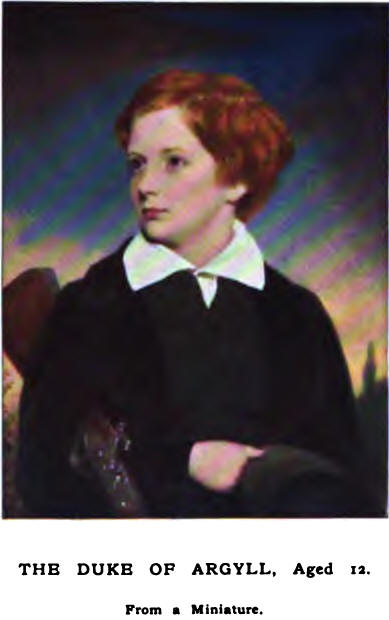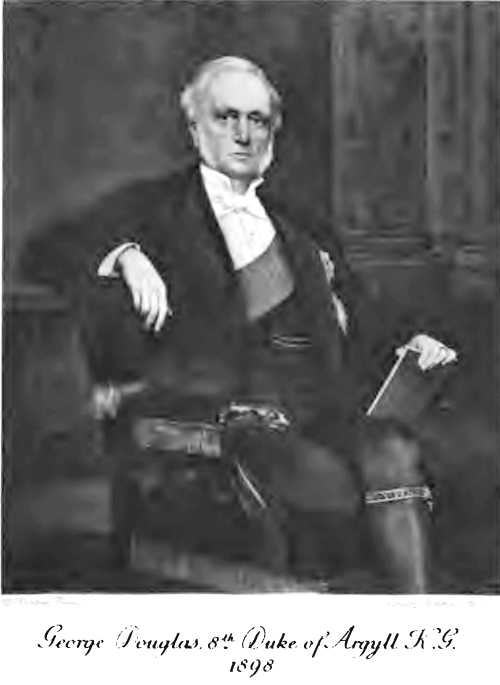|

PREFACE
The Autobiography of
the Duke of Argyll was begun in the year 1897, but, unhappily, it
was left unfinished.
The time that had been devoted to it meant to the writer some
pleasant hours, and he was working at it in his leisure moments to
the very end. Life had been to him so spaoious, and all Nature so
rich in interest and in beauty, that he had great pleasure in that
form of literary art in which memory was invoked to bring back from
the storehouse of the past all that had especially impressed
him—matters of high consequence to great States, talks with famous
men long since dead, how such a bird flew or dived on such a day,
how some new truth was welcomed, or some vital belief was again
confirmed. There was no bitterness in retrospect to one who could
look back as fearlessly as he could on a long career of public
service, of private duty, and of literary work; and set it down,
having nothing equivocal to explain away, no change to justify or
extenuate, no pronouncement of prinoiple to retract. The completion
of the work was left by the Duke in the hands of his wife, at whose
earnest
desire the Autobiography was undertaken, and who knew his thoughts
and wishes concerning it. In taking up the broken thread of the
narrative, the design has been to continue the history of his life,
as far as possible, in the Duke’s own words, giving his thoughts and
opinions through the medium of letters to friends, and quotations
from his speeches and writings.
The Editor owes a debt of gratitude to all who have most kindly
rendered important assistance in the carrying out of the work, by
searching for letters from the Duke, often a laborious task when
they were not of recent date, and especially when it so happened
that these letters were amongst the still untouched papers of those
who are gone. Permission has been kindly granted in many cases for
the use and publication of valuable correspondence, and the kind and
helpful sympathy shown in connection with the responsible work of
editing these volumes has been deeply felt and appreciated.
Her Majesty Queen Victoria graciously granted permission to the Duke
to publish in this work some of her letters, and those of the Prince
Consort.
To the Earl of Mayo grateful thanks are due for his kindness in
lending the correspondence of the Duke with the late Lord Mayo, who
was Viceroy of India during a portion of the time when the Duke held
the office of Secretary of State for India. The late Earl of
Northbrook, who Succeeded Lord Mayo as Viceroy, also most kindly
placed his correspondence with the Duke at the disposal of the
Editor.
Grateful acknowledgment is due to the Duke of Devonshire; the
Marquis of Salisbury; Mr. Henry Gladstone, with regard to the
extensive correspondence with his father; Viscount Peel; Lord
Tennyson; the Hon. Hollo Russell; Lord Stanmore; the Marchioness of
Dufferin and Ava; Countess Granville; Lady Lilford; Miss Palgrave;
the Earl of Halsbury; Earl Spencer; Mr. Bernard Mallet; the Hon.
Evelyn Ashley; Mr. Charles Francis Adams; Lord Avebury; the Earl of
Selbome; the Bight Hon. Joseph Chamberlain; Lord Playfair; Mr. John
Bright; Mr. Cree; Mr. Bosworth Smith; Professor Mackintosh;
Professor Knight; Professor Butcher; Mr. Foreman; Sir Arthur
Mitchell; the Archbishop of Canterbury; the Bishop of Bipon; Canon
MacColl; the Very Bev. Donald Macleod; Sir Edmond Vemey; the Bev. J.
Howson; Herr Prelat von Schmidt; and to Lady Vernon Harcourt, for
permission to publish the letters of her father, Mr. Motley.
With regard to scientific papers, special thanks are due to Mr.
Fletcher, head of the mineralogical department of the British
Museum; Sir George Darwin; Sir Leonard Lyell; Lord Kelvin; Sir John
Murray; Mr. Harvie Brown; Lady Flower; Mrs. Tyndall; Mrs. Max
Muller; to Mrs. Owen, in connection with the letters of Sir Richard
Owen; and to the trustees of Mr. Herbert Spencer.
Only deep regret can be felt for the irreparable loss entailed by
the Autobiography having been left unfinished; but the pages which
follow may not be wholly unworthy of his memory, if they have been
made to show even a vague image of that intrepid and magnanimous
spirit which remains bo clear and so living to those who knew him.
INA ARGYLL.
CONTENTS OF VOLUME I
Chapter I. Parentage
Chapter II. John, Fifth Duke, and John, Seventh Duke of Argyll
Chapter III. Ardencaple
Chapter IV. My Early Days and Pursuits
Chapter V. Religious Influences - Visits to England
Chapter VI. Bosneath - Scientific Interests - My Father's Succession
to the Dukedom - Skerryvore Lighthouse
Chapter VII. Entry into Political Life
Chapter VIII. Church of Scotland
Chapter IX. Foreign Travel
Chapter X. Life in Kintyre - Early Interest in Economic Questions -
Visit to Mull - Lectures at Edinburgh - Visit to Trentham
Chapter XI. Voyage to Greece - Winter in Rome - Return to England by
the Rhine - Visit to Field of Waterloo
Chapter XII. Marriage - Bosneth - Potatio Famine and Abolition of
Corn Laws - Formation of Peelite Party - Rise of Disraeli
Chapter XIII. Economic Problems Affecting Argyll Properties - Visits
to the Hebrides
Chapter XIV. Death of my Father - Visit of the Queen and Prince
Consort to Inveraray - Banquet to Lord Dalhousie - Literary Work
Chapter XV. The Byland Case - Exhibition of 1851 - Visitr to the
Hebrides - Winter in Edinburgh
Chapter XVI. Opening of Glasgow Athenasum - Exhibition of 1851 -
First Offer of Government Office - The Coup D'Etat - Discovery of
Ardtun Leaf - Bed - Elected Chancellor of St. Andrew's University
Chapter XVII. Fall of Lord John Russell's Government - Lord Derby's
and Lord Aberdeen's Administrations
Chapter XVIII. Argyll Lodge - London Society and Friends
Chapter XIX. Gladstone’s Budget
Chapter XX. Outbreak of the Crimean War
Chapter XXI. The Crimean War
Chapter XXII. Cabinet Crisis - Resignation of Lord Palmerston - The
'Four Points' - Letter to Lord Clarendon
Chapter XXIII. Difficulties in the Crimea - Lord Raglan - Bill for
Enlistment of Foreign Troops
Chapter XXIV. Troubles in the Crimea - Resignation of Lord John
Russell - Defeat of Aberdeen Government - Formation of Ministry by
Lord Palmerston - Resignation of Mr. Gladstone, Sir James Graham and
Mr Sidney Herbert
Chapter XXV. Austrian Proposals for Peace - Attitude of Gladstone -
Lord Clarendon's Proposal for a Treaty with Sweden
Chapter XXVI. Meeting of British Association at Glasgow -
Resignation of Privy Seal - Appointed Postmaster-General - Proposals
for Peace
CONTENTS OF VOLUME II

Chapter XXVII. Visit
to Hawarden - Work at the Post Office - Question of Life Peerages -
Lord Lynd - Hurst's Speech - Treaty of Paris
Chapter XXVIII. Correspondence with Mr. Gladstone on the Crimean War
Chapter XXIX. Sympathy with the Ant-Stavery Movement - Visit of Mrs.
Stone to England and to Inverary - Difficulty with China - General
Election
Chapter XXX. Indian Mutiny - Sir Colin Campbell - Lord Dalhouse -
Commercial Crisis
Chapter XXXI. Lord Palmerson's Administration
Chapter XXXII. The Derby Administration
Chapter XXXIII. Lord Palmerston’s Second Ministry
Chapter XXXIV. The American Civil War
Chapter XXXV. Foreign Politics
Chapter XXXVI. Reform
Chapter XXXVII. Disestablishment of the Irish Church
Chapter XXXVIII. The Irish Land Bill
Chapter XXXIX. India
Chapter XL. The Franco-Prussian War - Army Reform - Education -
Church and State
Chapter XLI. The Irish Land Bill
Chapter XLII. The Eastern Question - Ornithology
Chapter XLIII. The Franchise Bill - The Soudan - Liberalism and
Radicalism
Chapter XLIV. Home Rule
Chapter XLV. Scottish Disestablishment - The Armenian Question
Chapter XLVI. Science
Chapter XLVII. Literary Work - Jubilee - Queen Victoria - Natural
History - Poetry - Characteristics
Chapter XLVIII. Appreciations |

